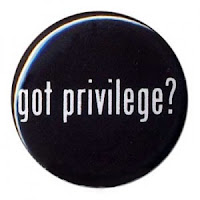Several weeks ago, fellow disability blogger and Facebook friend
Dominick Evans posted his answers to a
checklist on privilege. The idea is that you start out “standing” at the midpoint on a scale of social and economic privilege, then take steps forward, backward, or stand still, according to your answer to each question. The questionnaire isn’t designed specifically for disabled people, but I think it produces a fairly accurate, honest picture of relative privilege.
Here are my answers. As you will see, my disabilities subtract fairly little from an overall surplus of privilege. For what it’s worth, my score feels more or less correct to me.
1. If your parents worked nights and weekends to support your family, take one step back.
No. Stay.
2. If you are able to move through the world without fear of sexual assault, take one step forward.
I’m not sure my confidence is justified, but I don’t think about it, so Yes. Step Forward.
3. If you can show affection for your romantic partner in public without fear of ridicule or violence, take one step forward.
Yes. Step Forward.
4. If you have ever been diagnosed as having a physical or mental illness/disability, take one step back.
Yes. Step Backwards.
5. If the primary language spoken in your household growing up was not English, take one step back.
No. Stay.
6. If you came from a supportive family environment take one step forward.
Yes. Step Forward.
7. If you have ever tried to change your speech or mannerisms to gain credibility, take one step back.
Maybe a little bit, due to disability, but on balance I would say No, I have never really felt a need to adapt in any cosmetic ways. Stay.
8. If you can go anywhere in the country, and easily find the kinds of hair products you need and/or cosmetics that match your skin color, take one step forward.
Yes. Step Forward.
9. If you were embarrassed about your clothes or house while growing up, take one step back.
No. Stay.
10. If you can make mistakes and not have people attribute your behavior to flaws in your racial/gender group, take one step forward.
No. I have many times felt that mistakes and shortcomings were attributed to my disabilities. Stay.
11. If you can legally marry the person you love, regardless of where you live, take one step forward.
I am going to say No, because of how marriage adversely affects disability benefits. Stay.
12. If you were born in the United States, take one step forward.
Yes. Step Forward.
13. If you or your parents have ever gone through a divorce, take one step back.
Yes. Although it happened when I was a young adult, my parents divorced. Step Back.
14. If you felt like you had adequate access to healthy food growing up, take one step forward.
Yes. Step Forward.
15. If you are reasonably sure you would be hired for a job based on your ability and qualifications, take one step forward.
No, I’m not sure of this, because of my disabilities. Stay.
16. If you would never think twice about calling the police when trouble occurs, take one step forward.
Yes. Although police behavior concerns me, I don’t personally feel like I am at greater risk. Step Forward.
17. If you can see a doctor whenever you feel the need, take one step forward.
Yes. Step Forward.
18. If you feel comfortable being emotionally expressive/open, take one step forward.
No, not entirely. Stay.
19. If you have ever been the only person of your race/gender/socio-economic status/sexual orientation in a classroom or workplace setting, please take one step back.
Yes, I have been the only disabled person. Step Back.
20. If you took out loans for your education backward.
No. Stay.
21. If you get time off for your religious holidays, take one step forward.
Yes. Step Forward.
22. If you had a job during your high school and college years, take one step back.
No, not really, and certainly not by necessity. Stay.
23. If you feel comfortable walking home alone at night, take one step forward.
Yes. Step Forward.
24. If you have ever traveled outside the United States, take one step forward.
Yes. Step Forward.
25. If you have ever felt like there was NOT adequate or accurate representation of your racial group, sexual orientation group, gender group, and/or disability group in the media, take one step back.
Yes. Step Back.
26. If you feel confident that your parents would be able to financially help/support you if you were going through a financial hardship, take one step forward.
Yes. It happened more than once. Step Forward.
27. If you have ever been bullied or made fun of based on something that you can’t change, take one step back.
Not often, but Yes. Step Back.
28. If there were more than 50 books in your house growing up, take one step forward.
Yes. Step Forward.
29. If you studied the culture or the history of your ancestors in elementary school take one step forward.
Yes. Step Forward.
30. If your parents or guardians attended college, take one step forward.
Yes. Step Forward.
31. If you ever went on a family vacation, take one step forward.
Yes. Step Forward.
32. If you can buy new clothes or go out to dinner when you want to, take one step forward.
Most of my life, Yes. Now, No. Stay.
33. If you were ever offered a job because of your association with a friend or family member, take one step forward.
Yes. Step Forward.
34. If one of your parents was ever laid off or unemployed not by choice, take one step back.
No. Stay.
35. If you were ever uncomfortable about a joke or a statement you overheard related to your race, ethnicity, gender, appearance, or sexual orientation but felt unsafe to confront the situation, take one step back.
Yes, regarding disability, and I felt uncomfortable about confronting the person. Step Back.
RESULT: I am 11 steps ahead of where I started.
This questionnaire is pretty good, but it could be better at measuring disability factors. For example:
1. For disabled people, not having had a job during high school or college is usually a competitive disadvantage, rather than an indicator of privilege, as question 22 seems to assume. I’m not sure how to fix that for scoring, but it should be addressed.
2. Disability should be added as a possible factor to many of these questions where they aren’t already.
3. Add a question about being able to easily purchase clothes that fit properly and preset you in a stylish, professional manner, which is hard or impossible to do for many disabled people.
4. Add a question about whether you need direct, one-on-one help with essential everyday tasks in order to function. This is something that some, but not all disabled people need, and is a disadvantage in terms of privilege, even when daily help is available, because it is a major life factor other people simply don’t have to deal with.
None of these adjustments would change my overall results very much, but they would make this a more useful questionnaire overall.
This thing isn't meant to make you feel bad, no matter what the outcome. It's more of a self-awareness and thinking tool. Give it a try.


























